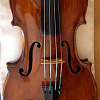We have thousands of human-written stories, discussions, interviews and reviews from today through the past 20+ years. Find them here:

June 2014
V.com weekend vote: What is your best time of day for practicing?
June 28, 2014 16:33

Some people are night owls, others are early-risers. Often times, our busy schedules don't allow us to choose the optimum time for practicing. But if you could choose any time of day, what would be your best practice time, to really concentrate and accomplish things?
Tweet
V.com weekend vote: Which way best describes the way you practice: blocked, serial or random?
June 20, 2014 12:33This week we shared some great ideas about practicing methods from two speakers at the Primrose viola competition and festival.
Among the more radical of the ideas was that random practice produces better performance results than does blocked practice. That is, really mixing up what you practice will prepare you better for performance than will the kind of concentrated practice, in which you devote a long chunk of time to one task. The "random practice" notion was somewhat new to me, so I wondered, do many people already practice this way?
Which way best describes the way you practice?
Blocked practice: Practicing each item for one good, solid chunk of time
Serial practice: Practicing in chunks of time, but mixing it up a little so that you hit each task several times throughout the session.
Random practice: Mixing it up a lot; changing tasks very frequently.
Tweet
V.com weekend vote: Do you play the viola?
June 13, 2014 09:52This week I've been watching a lot of high-level viola performances, masterclasses, technique classes and lectures with the 2014 Primrose International Viola Competition and Festival, which continues through tomorrow at The Colburn School in Los Angeles.
 Certainly the violin and viola have a strong relationship to one another, and many (perhaps most?) violists begin their learning on the violin before they switch to viola. Or one learns both instruments for teaching purposes. For many, they fall in love with the lower viola sound (and better job prospects) and never look back. Or, the viola becomes something they just play when needed, but they still primarily play violin. Some musicians play both instruments equally well.
Certainly the violin and viola have a strong relationship to one another, and many (perhaps most?) violists begin their learning on the violin before they switch to viola. Or one learns both instruments for teaching purposes. For many, they fall in love with the lower viola sound (and better job prospects) and never look back. Or, the viola becomes something they just play when needed, but they still primarily play violin. Some musicians play both instruments equally well.
So our question of the week is: Do you play the viola? And if so, is it a primary or secondary instrument?
Tweet
V.com weekend vote: Can everyone learn?
June 6, 2014 14:35The idea of "everyone can learn" came up in several ways this week.
First, in this blog, I referred to Shinichi Suzuki's idea that every child has ability and can learn to play the violin, given the right environment. Suzuki's concepts (and remarkable success rate) have become more widespread and changed many people's ideas about the concept of "talent" -- the idea that talent is inborn for all people and simply needs cultivation.
Suzuki also promoted the idea that it helps to start very young, just as that helps in learning a language. But with teachers being more open to talent as educable and with the advent of the Internet, people have had greater success and encouragement in learning violin later in life.
So can everyone learn, truly? This was a question posted in this blog by Kate Little.
Some teachers embrace the idea, others don't. But is it true, that all people can learn, despite age or "talent"? What do you think?
Tweet
More entries: May 2014











